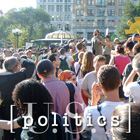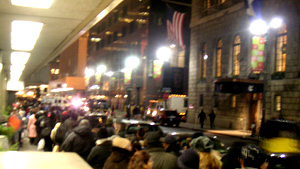
|
22 December 2005 As New York City's public transport strike reached the end of its second day, it became clear the city was facing a difficult crisis. Reports began to mount of strangers helping strangers, sharing cars for rides into the city, and cab drivers were forced to reorganize their service to accommodate multiple fares simultaneously. Mayor has sought to depict strike as "illegal" and "selfish", says those who can least afford it are being harmed by transport inconvenience. Big companies are reported to have hired buses, vans, to collect employees, bring them to work, but those with less money in the bank having to walk long distance, unable to find places on overcrowded non-MTA commuter trains, missing working hours or unable to reach work. Mayor Mike Bloomberg referred to union members as "thugs", a remark which raised some criticism for its insensitivity and revealed official frustration. The Transit Workers Union (TWU) has demanded that the Metropolitan Transit Authority (MTA) negotiate better terms for long-term benefits and pensions for its workers, before ending the strike. But officials at all levels have flatly refused to negotiate further as long as what they call an illegal strike continues. Radio interviews with pedestrians, commuters and residents of New York seem to show anecdotally that feelings are mixed. There is some support for the pleas by transit workers to be taken care of and given adequate wages, but many are upset by the inconvenience and offended by the negative impact the strike has had among poorer New Yorkers. Authorities threatened to seek warrants for the arrest of union leaders for organizing the strike in violation of state law, and to impose personal fines on individual striking workers, possibly also seeking to jail them. The WTU, however, refused to budge, and demanded that assurances be given that negotiations will resume immediately. Now comes word that the strike will end., according to Reuters reports and the mediators invovled in the dispute. The MTA has reportedly agreed to resume negotiations toward a serious move to address the union's pensions concerns, so long as the strike is abandoned. It now looks as if both sides have agreed to re-enter negotiations, and transit workers will begin returning to work, with an estimated 18 hours required to restore the transit system to full service. There had been fears the strike would cause more than just inconvenience, by cutting into the city's holiday boom cycle. The last major transit strike in New York City lasted 11 days, and caused widespread disruption of the city's normal economy. Some estimates suggested the city may have lost as much as $1 billion in just three days of the strike, due to the impact on retails sales and other revenues. [s] |
|||||||
|
||||||||




